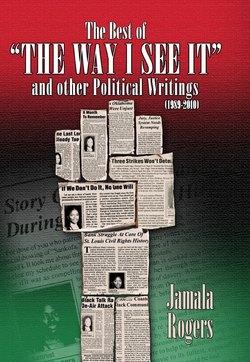Читать книгу The Best of "The Way I See It" and Other Political Writings (1989-2010) - Jamala Rogers - Страница 6
На сайте Литреса книга снята с продажи.
Human Rights are Gay Rights
ОглавлениеJune, 1998
One of the highlights of the Gay Pride Weekend was the signing of a city ordinance by Mayor Clarence Harmon to allow same-sex couples visitation rights at the City’s hospital and security facilities. No doubt, this will be added to the reasons for why St. Louis was voted among the top twenty cities as one of the best places for gays and lesbians. In spite of some progress, the lifestyle and social movement of gays, lesbians, bisexuals and transgenders is still shrouded in myths and mistruths. The African American community has definitely absorbed anti-gay messages from the mainstream that feeds into the similar forms of discrimination we experience daily. That should sensitize us not to victimize others. This isn’t always so.
The Lesbian/Bisexual/Gay/Transgendered (LBGT) Movement, like any other social and political movement, has its own set of internal contradictions, especially around race and class issues. African Americans who identify themselves with this sexual and gender orientation get hit with a double edged sword. They often face racism in the gay community and marginalization in the black community. In most places, their collective voices are seldom heard as a group and they remain invisible as a social force.
Every once in a while, an event or incident gives them a forum. When the National Black Gay & Lesbian Leadership Forum challenged organizers of the Million Man March for anti-gay remarks, the Forum refused to endorse the march. After serious discussion between the two parties, it was agreed that black gay men would be able to participate openly and safely in the historic march. The current hostile environment is against anybody not white, straight or rich.
The non-acceptance of gays has not always been that way. There are number of famous black people who were gay and highly respected. The Harlem Renaissance was heavily influenced by gay and bisexual blacks. Most notable were Alain Lock, Claude McKay, and Countee Cullen. Other lesbian and bisexual performers of a later era included Ma Rainey, Bessie Smith, Josephine Baker, Jackie “Moms” Mabley, Alberta Hunter and Ethel Waters. Literary giants Lorraine Hansberry and James Baldwin were also known gays. More recently, we’ve seen gay or lesbian black public officials such as Sherry Harris, Seattle City Council and Kenneth Reeves, mayor of Cambridge, MA. Billye Avery headed up the first national organization to focus on the health needs of black women, the Black Women’s Health Project. The list goes on.
The atmosphere seemed to change in the 1950s when people like Senator John McCarthy and FBI head J. Edgar Hoover, ushered in the communist scare, which had a ripple effect. Bayard Rustin, one of the principal organizers of the 1963 March on Washington had to suppress his homosexuality for fear of reprisal on the Civil Rights Movement. At the recent Black Radical Congress, Barbara Smith proclaimed the challenges of being black and out in these contemporary times. Along with the late Audre Lorde, New York State Poet Laureate, these black lesbians helped to co-found Kitchen Press, the first and only press for women of color. Their lives were and are no crystal stairs.
What is the point of all this? The African American community is in no position to throw stones at anyone who is different. We must resist the hypocrisy and violence of the same dominant society who do so to members of the gay community. It is the same system that consistently kicks us in the butt. As with some white people who believe being in contact with blacks will “rub off,” we sometimes approach gays and lesbians in a similar manner. We need to educate ourselves in order to dispel myths, one example being the idea that all homosexuals molest children, when clearly the statistics show that a greater percentage of straight people commit these acts.
Black gays and lesbians are some of the fiercest fighters of civil and human rights. We must always include them in our struggle against racism and discrimination. We must value the positive contributions of all our people, regardless of one’s sexual preference. We are family and there needs to be a seat at the table for everyone.
